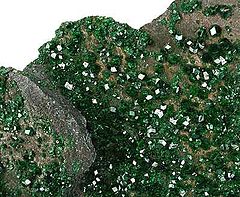Uvarovite
| Uvarovite | |
|---|---|

Uvarovite druse from Urals Region, Russia (size: 18.3 x 13.1 x 2.0 cm)
|
|
| General | |
| Category | Nesosilicate |
|
Formula (repeating unit) |
Ca3Cr2Si3O12 |
| Strunz classification | 9.AD.25 |
| Crystal system | Cubic |
| Crystal class | Hexoctahedral (m3m) H-M symbol: (4/m 3 2/m) |
| Space group | Ia3d |
| Unit cell | a = 11.99 Å; Z = 8 |
| Identification | |
| Color | Green, emerald-green, green-black |
| Crystal habit | Euhedral crystals, granular, massive |
| Fracture | Uneven, conchoidal |
| Mohs scale hardness | 6.5–7.5 |
| Luster | Vitreous |
| Streak | White |
| Diaphaneity | Transparent, translucent |
| Specific gravity | 3.77 - 3.81 |
| Optical properties | Isotropic |
| Refractive index | n = 1.865 |
| Other characteristics | Fluorescent red in both short and long UV |
| References | |
Uvarovite is a chromium-bearing garnet group species with the formula: Ca3Cr2(SiO4)3. It was discovered in 1832 by Germain Henri Hess who named it after Count Sergei Semenovitch Uvarov (1765–1855), a Russian statesman and amateur mineral collector.
Uvarovite is one of the rarest of the garnet group minerals, and is the only consistently green garnet species, with an emerald-green color. It occurs as well-formed fine-sized crystals.
It is found associated with chromium ores in Spain, Russia, and Quebec in Canada. It also occurs in Finland, Norway, and South Africa.
...
Wikipedia
